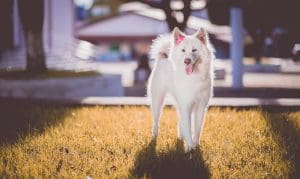
Instinctual Behavior
Believe it or not, dogs are descendants of wolves. In the wild, wolves eat the entire prey, including bones and organs. This instinctual behavior stems from their ancestors’ need to extract every bit of nutrition from their meals. Although our domesticated dogs no longer rely on this behavior for survival, some may still possess this instinct, leading them to eat feces.
Nutritional Deficiencies
Another reason why your dog may be eating poop is due to a nutritional deficiency in their diet. When a dog’s diet lacks specific essential nutrients, they may seek to supplement their diet by consuming feces. This behavior is widespread in puppies or dogs on a low-quality diet. Ensuring your dog receives a balanced and nutritious diet is crucial in preventing coprophagia.
Behavioral Issues
Sometimes, a dog’s poop-eating behavior may stem from underlying behavioral issues. Dogs are social animals, and when they feel anxious, bored, or stressed, they may engage in behaviors that seem strange to us. Eating poop can be a sign of anxiety, attention-seeking behavior, or even a compulsive disorder. Suppose you suspect that your dog’s coprophagia is related to behavioral issues. In that case, it is advisable to consult a professional dog trainer or a veterinarian who can guide behavior modification techniques.
Addressing the Issue:
Now that we have discussed some of the reasons why dogs eat poop let’s explore how you can address this issue if your furry friend is engaging in this behavior.
1. Consult Your Veterinarian:
If you notice that your dog’s poop-eating behavior is persistent or accompanied by other concerning symptoms, such as vomiting or diarrhea, it is crucial to consult your veterinarian. They can rule out any underlying medical conditions contributing to this behavior.
2. Ensure a Nutritious Diet:
Providing your dog with a well-balanced and nutritious diet is essential in preventing coprophagia caused by nutritional deficiencies. Speak with your veterinarian to ensure your dog’s diet meets their needs. They may recommend high-quality dog food or suggest supplements to address any deficiencies.
3. Keep the Environment Clean:
Keeping your dog’s living environment clean is vital in preventing access to feces. Regularly clean up your backyard, litter box, or any other area where your dog has access to poop. You can discourage your dog from engaging in this behavior by eliminating the temptation.
4. Positive Reinforcement:
Using positive reinforcement techniques can also be beneficial in addressing coprophagia. Reward your dog with treats, praise, or playtime when they exhibit desirable behaviors, and refrain from eating poop. This helps to reinforce good behavior and redirect their attention away from the behavior you want to discourage.
Remember, addressing coprophagia requires patience and consistency. It may take time for your dog to unlearn this behavior, but you can help them overcome it with proper guidance and understanding.
In conclusion, while the sight of your dog eating poop may be distressing, it’s essential to approach this issue with empathy and understanding. By exploring the reasons behind this behavior and taking appropriate steps to address it, you can help your dog lead a healthier and happier life.






